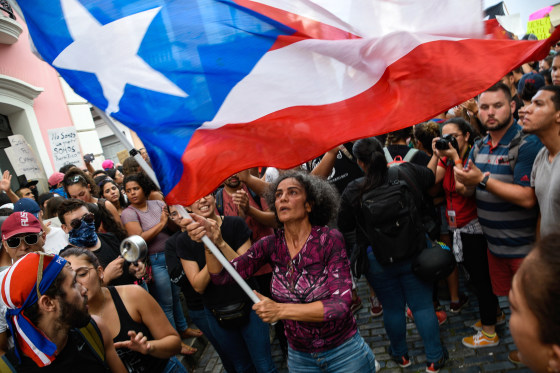A national coalition of stateside Puerto Ricans say they “are deeply disappointed” that President Joe Biden's task force on the island won't weigh in on the ongoing congressional debate over the island’s political status.
Power 4 Puerto Rico, a group that advocates for federal policies and legislation that address Puerto Rico’s recovery and economic growth, sent a letter to Biden on Wednesday.
According to a copy of the letter obtained by NBC News, the group said that while they are pleased by efforts to bring back a “working group that is meaningfully empowered to coordinate Puerto Rico federal policy” that also addresses reconstruction challenges, “it would be negligent of the task force” to ignore one of “two major underlying structural barriers to Puerto Rico’s prosperity: 123 years of U.S. colonialism.”
A month ago, Biden revived a White House Puerto Rico task force to advance rebuilding efforts in the U.S. territory following Hurricanes Maria and Irma in 2017, last year’s earthquakes and the pandemic.
The White House task force held its first meeting on July 20. Among the attendees were 10 members of Biden’s Cabinet and four deputy agency secretaries. Its top priority is to invest in the island's long-term resilience and infrastructure to ensure communities can withstand future disasters, according the White House.
In their letter, Power 4 Puerto Rico cited a column Biden wrote for The Orlando Sentinel on December 2019 in which he promised to “engage Puerto Ricans — including representatives of every status option — in a process of self-determination, listening and developing federal legislation that outlines a fair path forward.”
A White House spokesperson told NBC News in an email Thursday that “the White House Working Group on Puerto Rico was established to provide Puerto Rico the resources and technical assistance it needs to recover and prosper.”
“We look forward to having more to say about these efforts in the weeks and months ahead,” the spokesperson said.
The issue around the future of the island’s territorial relationship to the mainland has been subject of debate and tensions for decades.
Power 4 Puerto Rico recently rallied in support of the Puerto Rico Self-Determination Act of 2021, a bill introduced by New York Democratic Reps. Alexandria Ocasio-Cortez and Nydia Velázquez, to create a “status convention” made up of delegates elected by Puerto Rican voters who would be responsible for coming up with long-term solutions for the island’s territorial status — statehood, independence or other options beyond its current territorial arrangement, such as a free association.
An opposing bill from Rep. Darren Soto, a Florida Democrat, and Rep. Jenniffer González, Puerto Rico’s nonvoting member of Congress and a Republican, aims to expedite statehood for Puerto Rico.
Gretchen Sierra-Zorita, the White House’s associate director for Puerto Rico and the territories, told NBC News last month that members of the newly formed task force “don’t have jurisdiction on status, but we do have jurisdiction on the billions of dollars that have gone to the island.”
White House officials have said that reinstating the task force, which existed during almost every recent administration except Donald Trump’s, was part of Biden’s campaign promise to Puerto Ricans. Under Trump, Coast Guard Rear Adm. Peter Brown was appointed as the White House’s special representative for Puerto Rico’s disaster recovery, 10 months before Trump’s term ended.
Power 4 Puerto Rico argues that a major structural barrier holding back the island’s economic growth is “the undemocratic financial control board imposed by Congress under the PROMESA federal law,” an issue they believe the new working group should tackle.
The 2016 Promesa law created a federally appointed fiscal board responsible for restructuring Puerto Rico’s $72 billion public debt after U.S. laws arbitrarily excluded the U.S. territory from the federal bankruptcy code, a move that deprived the island from resolving their fiscal crisis through Chapter 9. Instead, it has resulted in tough austerity measures.
The federal government has allocated over $69 billion in recovery funds to Puerto Rico, but communities on the island have received only close to $21 billion, according to the Office of Recovery, Reconstruction and Resiliency. Most of the funds have been allocated to the Federal Emergency Management Agency and the departments of Education and Housing and Urban Development.
“We want to spend our energy and focus on doing it right, or at least attempt to do it right, rather than to be bogged down by a debate on the status,” Sierra-Zorita said.
According to Sierra-Zorita, the task force’s recommended policy priorities include economic development, education and workforce development and recovery, which addresses issues limiting Puerto Rico’s capacity to manage its crises.
Follow NBC News Latino on Facebook, Twitter and Instagram.

